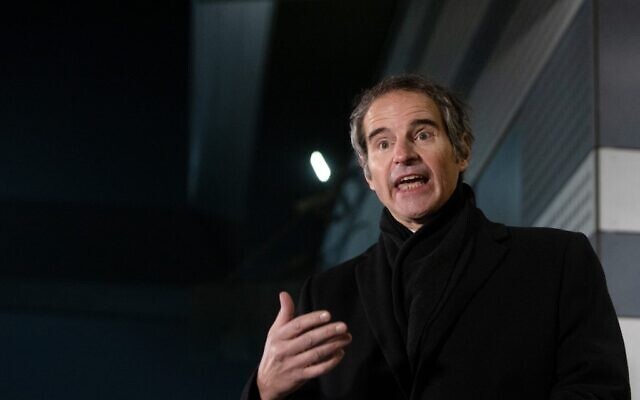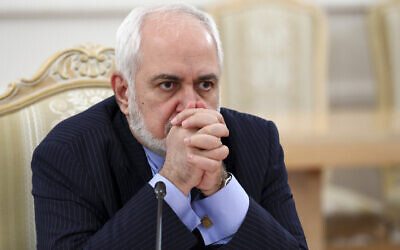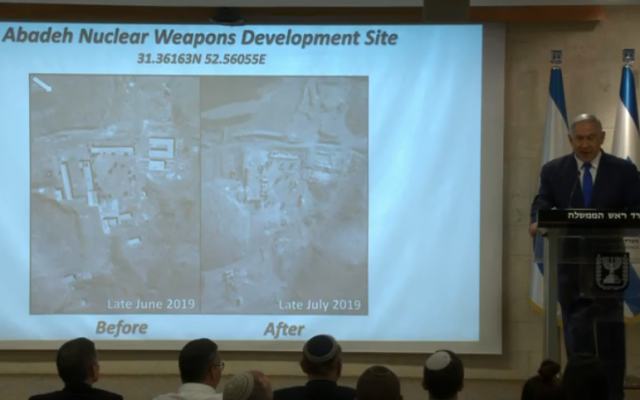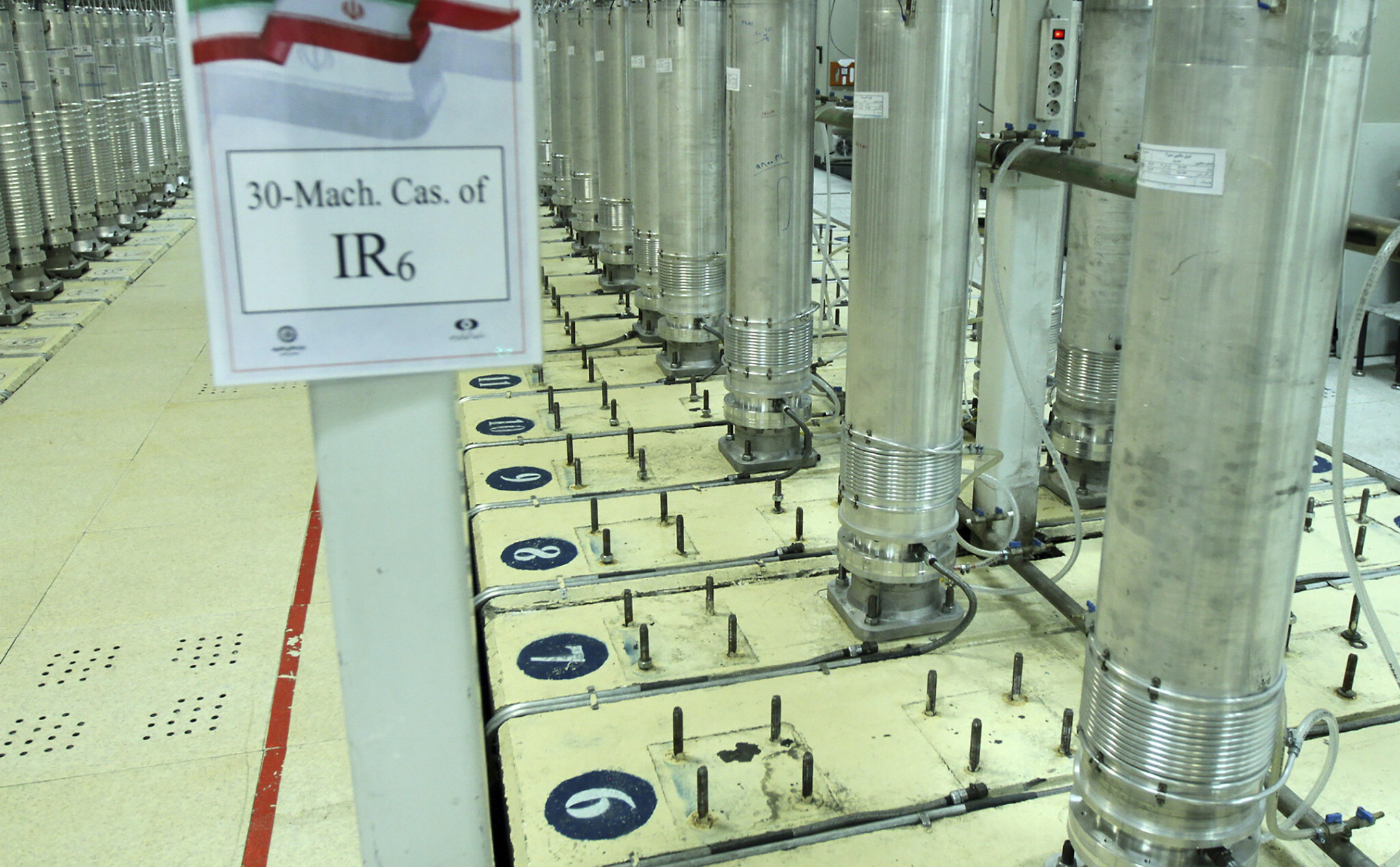After meeting with officials in Tehran, IAEA head says watchdog will continue necessary monitoring and verification of Iranian program

The head of the United Nations’ nuclear watchdog said that Iran will begin offering its inspectors “less access,” but will still allow the agency to monitor its atomic program.
Rafael Grossi made the comments on arrival in Vienna late Sunday night after holding talks with officials in Tehran. He was careful to say that there still would be the same number of inspectors, but there would be “things we lose.”
“What we agreed is something that is viable — it is useful to bridge this gap that we are having now, it salvages the situation now,” Grossi told reporters.
“There is less access, let’s face it. But still, we were able to retain the necessary degree of monitoring and verification work,” he said.
Iran’s conservative-dominated parliament passed a law in December demanding the country suspend some inspections if the US failed to lift sanctions.
The law is due to go into effect on Tuesday.
“This law exists, this law is going to be applied, which means that the Additional Protocol, much to my regret, is going to be suspended,” Grossi said, referring to a confidential inspections agreement between Tehran and the IAEA reached as part of the nuclear deal.
Grossi did not give details of precisely which activities the IAEA would no longer be able to do, but confirmed that the number of inspectors in Iran would not be reduced and that snap inspection could continue under the temporary arrangement.
In a joint statement, the IAEA and the Atomic Energy Organization of Iran said that “a temporary bilateral technical understanding” had been reached “whereby the IAEA will continue with its necessary verification and monitoring activities for up to three months.”
The two sides further agreed to keep the understanding under regular review to “ensure it continues to achieve its purposes.”
Iranian Foreign Minister Mohammad Javad Zarif, who under President Hassan Rouhani helped reach the nuclear deal, said the cameras of the International Atomic Energy Agency would be shut off despite Grossi’s visit.
“This is not a deadline for the world. This is not an ultimatum,” Zarif told the government-run, English-language broadcaster Press TV in an interview aired before he met Grossi Sunday. “This is an internal domestic issue between the parliament and the government.”
“We have a democracy. We are supposed to implement the laws of the country. And the parliament adopted legislation — whether we like it or not.”
Zarif’s comments marked the highest-level acknowledgement yet of what Iran planned to do when it stopped following the so-called “Additional Protocol.”
Under the protocol with Iran, the IAEA “collects and analyzes hundreds of thousands of images captured daily by its sophisticated surveillance cameras,” the agency said in 2017. The agency also said then that it had placed “2,000 tamper-proof seals on nuclear material and equipment.”
In his interview, Zarif said authorities would be “required by law not to provide the tapes of those cameras.” It wasn’t immediately clear if that also meant the cameras would be turned off entirely as Zarif called that a “technical decision, that’s not a political decision.”

“The IAEA certainly will not get footage from those cameras,” Zarif said.
Grossi made his trip to Tehran as Iran has been trying to pressure Europe and the new Biden administration into returning to the 2015 nuclear deal, which former US president Donald Trump unilaterally withdrew America from in 2018, before imposing punishing sanctions on Iran that ravaged its economy.
Iran’s conservative-dominated parliament months ago demanded that, if the US does not lift sanctions by this Sunday, Iran will suspend some IAEA inspections from Tuesday.
But Iran has stressed it will not cease working with the IAEA or expel its inspectors.
Grossi met earlier Sunday with Ali Akbar Salehi, the head of Iran’s civilian nuclear program. Iran’s ambassador to the IAEA, Kazem Gharibabadi, later tweeted that “Iran and the IAEA held fruitful discussions based on mutual respect, the result of which will be released this evening.”
Uranium particles found
According to a report Friday, International Atomic Energy Agency inspectors last summer found uranium particles at two Iranian nuclear sites that Iran tried to block access to.
Iranian authorities had stonewalled the inspectors from reaching the sites for seven months before the inspection, and Iranian officials have failed to explain the presence of the uranium, the Reuters news agency reported, citing diplomats familiar with the UN agency’s wor.
The inspections took place in August and September of 2020, the report said. The IAEA keeps its findings secret and only shared the details of the find with a few countries.
The Wall Street Journal reported the suspicious findings earlier this month, without identifying the material.
The Reuters report did not identify the sites. Earlier reports said one of the sites was in Abadeh, south of Isfahan — a location that in September 2019 was flagged by Prime Minister Benjamin Netanyahu as the site of an alleged secret nuclear facility. Iran denies that it seeks nuclear weapons; Netanyahu is adamant that the regime is fooling the world, and has said that a trove of nuclear documents concerning its rogue program, smuggled out of Tehran by the Mossad two years, proves Iran’s duplicity.

Walking away
Already, Iran has slowly walked away from all the nuclear deal’s limitations on its stockpile of uranium and has begun enriching up 20%, a technical step away from weapons-grade levels.
It also has begun spinning advanced centrifuges barred by the deal, which saw Iran limit its program in exchange for the lifting of economic sanctions.

An escalating series of incidents since Trump’s withdrawal has threatened the wider Mideast. Over a year ago, a US drone strike killed a top Iranian general, causing Tehran to later launch ballistic missiles that wounded dozens of American troops in Iraq.
A mysterious explosion also struck Iran’s Natanz nuclear facility, which Iran has described as sabotage. In November, Iranian scientist Mohsen Fakhrizadeh, who founded the country’s military nuclear program some two decades earlier, was killed in an attack Tehran blames on Israel.
Zarif brought up the attacks in his interview with state TV, saying the IAEA must keep some of its information confidential for safety reasons.
“Some of them may have security ramifications for Iran, whose peaceful nuclear sites have been attacked,” Zarif said. “For a country whose nuclear scientists have been murdered in terrorist operations in the past — and now recently with Mr. Fakhrizadeh — confidentiality is essential.”
As reported by The Times of Israel
